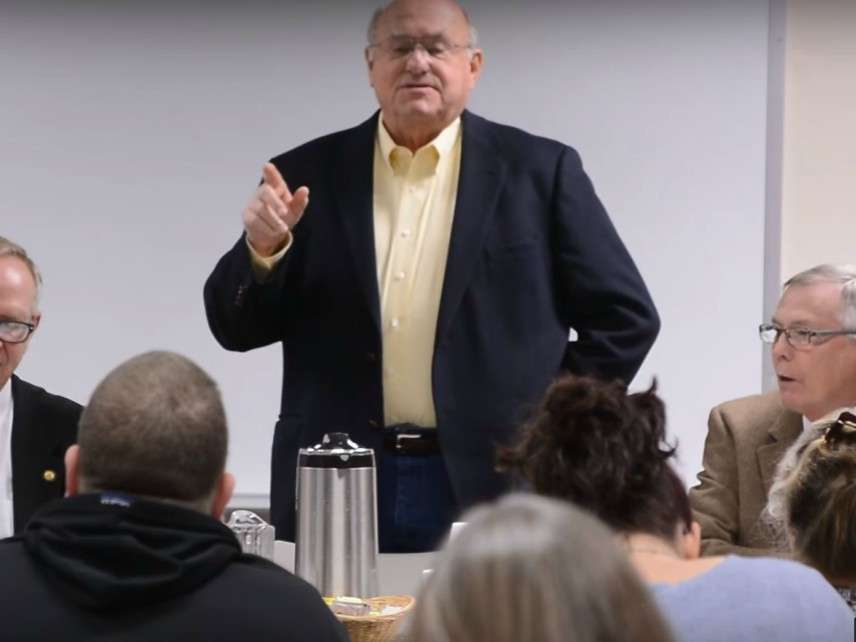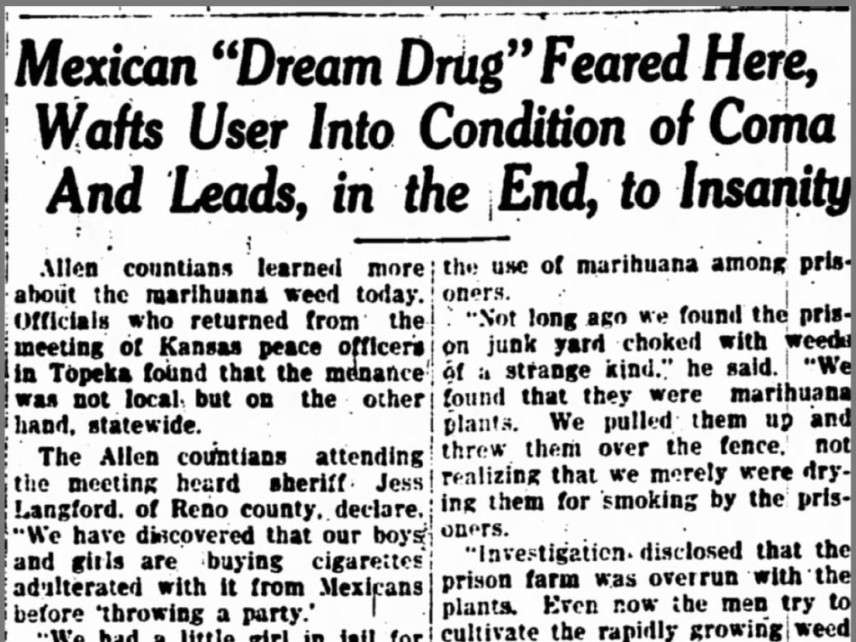Fear of Mexicans, Not Blacks, Led Kansas to Ban Marijuana
Defending pot prohibition, a state legislator picks on the wrong minority group.

Steven Alford, a Republican who represents Ulysses in the Kansas House of Representatives, recently opined that his state banned marijuana because blacks "responded the worst" to it, due to "their character makeup" and "their genetics." He was wrong, of course. The contemporaneous evidence suggests it was mainly Mexicans, along with white teenagers, who were on the minds of Alford's predecessors when they voted to ban marijuana in 1927 (not "in the '30s," as Alford claimed).
Coverage of marijuana in Kansas newspapers and in The Kansas City Star, across the border in Missouri, from the turn of the 20th century through 1930 tied the plant, over and over again, to frequently violent and usually permanent insanity in Mexicans. A widely carried 1904 story, attributed to the Mexican Herald, involved Manuel Guerrero and Florencio Pino, who after smoking cigarettes containing marijuana "ran amuck" in the street, "shouting, vociferating, and attacking everybody." The two men were "captured and sent to the hospital, where they had to be put in straitjackets." It was feared they would "lose their minds permanently, as is the case often with marihuana smokers."

A 1920 article in the Star described "a Mexican in Vera Cruz" who "attacked and killed a policeman and wounded three others" after smoking marijuana. "Such occurrences are frequent," the paper reported, averring that "people who become addicted to smoking marihuana finally lose their minds and never recover." According to the Star, marijuana's impact on "moral self-control" was especially dramatic in poor Mexicans. "With the Mexican peon," the paper reported in 1924, "the outcome is likely to be murder in its bloodiest form, or in any event some unnatural or revolting crime."
These outrages were not confined to Mexico. As Donald Trump might have said if he had been alive at the time, Mexicans were "bringing drugs" and "bringing crime" across the border. "The Mexican is the commonest user of marihuana in the United States," the Star reported in 1919. "While under its influence, he has the hallucination of being a man unseen and becomes dangerous, for he feels he is clothed with such invisibility he can commit any act with the assurance he cannot be seen. He becomes fearless and exceedingly hard to handle."
Blacks did figure prominently in subsequent anti-pot propaganda. But the only mention of blacks in connection with marijuana that I found in these papers during this period appeared in a 1924 Star report about California's "mounting problem" with marijuana, "mainly among Mexicans and negroes." Closer to home, the main worry was that Mexicans would pass their mind-destroying habit on to innocent white adolescents.
The Kansas ban on marijuana was largely the product of agitation by one C.H. Almond, a special agent with the Atchison, Topeka, and Santa Fe Railway who, according to a 1926 report in The Hutchinson News, knew from his experiences with railroad employees that "nine out of ten Mexicans who go crazy are victims of marihuana smoking." To his alarm, Almond said, he discovered that Mexicans were selling marijuana to Kansas high school students but could not be charged with a crime because state legislators had neglected to ban the plant. "Continued use of marihuana will cause violent insanity," Almond warned in 1926, urging a group of police officers in Topeka to support a state ban.
After Kansas banned marijuana, Almond successfully lobbied for a similar law in Missouri, also in the name of child protection. As the Star explained in 1930, the wicked weed appealed to "girls and boys of high school age in search of a 'kick' in the accelerated pace of their modern good times." The Star reported that Wyandotte County, Kansas, Sheriff Harry Powers had recently "raided a 'whoopee' party in a deserted house," finding "high school age boys and girls glassy-eyed and befuddled from smoking marihuana cigarettes."
Steven Alford, in short, was wrong even about the bigoted origins of his own state's ban on marijuana. It was Mexicans, not blacks, whose cannabis consumption scared Kansas legislators. They had heard that Mexicans were prone to commit violent crimes under the influence of what the Star called "the most harmful of narcotic drugs," a plant that produced "a species of insanity which frequently ends in horrible death." They worried that Mexicans were leading astray "the flaming youth of the country who do not realize the dangers involved in the drug," as Almond put it.
Asked to explain his remarks (which Brian Doherty noted here on Monday), Alford told The Garden City Telegram, "There are certain groups of people, their genetics, the way their makeup is, the chemicals will affect them differently. That's what I should have said was, drugs affect people differently, instead of being more specific." He added, "It's just the history of how come we are with the drug laws that we do have today, and how come the United States was so prevalent in outlawing drugs. I think we've got to look back to see what has happened in the past to look forward."
While you or I might look back at the racist roots of marijuana prohibition and shake our heads at how readily people can be led astray by fear and hatred of outsiders, Alford looks back and sees sound arguments in favor of continuing that policy. On Monday, when Alford finally seemed to understand that his perspective is not universally shared, he clarified that he was worried about marijuana's "damaging effects on the African American community," adding, "I regret my comments, and I sincerely apologize to anyone whom I have hurt."


Show Comments (22)